Considering the current moment of fighting against the coronavirus pandemic, at the same time that the oil and gas industry is doubly affected by the significant reduction in oil prices, I read the article “How the fourth industrial revolution can affect the oil and gas industry” that I wrote almost four years ago. My intention was to search for any adherence of the market cyclic model I proposed at that moment compared to what is happening right now. It is evident that the coronavirus pandemic brings a significant degree of non-linearity to the problem, especially regarding the global oil demand, that is facing a strong short-time reduction, that would never been forecasted, even by the best existing models. Therefore, I felt motivated to review the article and share some thoughts, based on my professional experience, observation of facts and some economic fundamentals.
CAUTION: At this point, I need to emphasize that the purpose of this article is just to encourage discussion about possible scenarios for the oil and gas industry, in a qualitative way, during and after the coronavirus pandemic. Any decision must take into account the specifics of each business and risks tolerated by every company.
Beyond the fundamentals communicated in the previous article, it is common sense that there are several uncertainties regarding the duration and effects of the coronavirus pandemic. However, in order to carry out a qualitative analysis, the adoption of the following assumptions is considered.
- The coronavirus pandemic should be resolved in a period of months, and then the demand for oil should return gradually to levels prior to the pandemic beginning.
- The free market economy defines the relationship between price and demand, and the coronavirus pandemic have a direct impact on global demand for oil, therefore, affecting the price.
- Due to physical characteristics of an oil and gas field, the industry needs to continuously invest in new production development projects to maintain at least a constant level of production.
To structure the discussion, three qualitative scenarios are presented, combining strategies for regulating oil production and managing the portfolio of new projects, which will have the role of maintaining and expanding production in the medium to long term.
Figure 1 is a reproduction of the model presented in the previous article and reflects a regular market cycle, where the demand of oil keep a historical trend of increase, while the production level oscillates between a regular level and a trend of increase, due to the development of new projects.
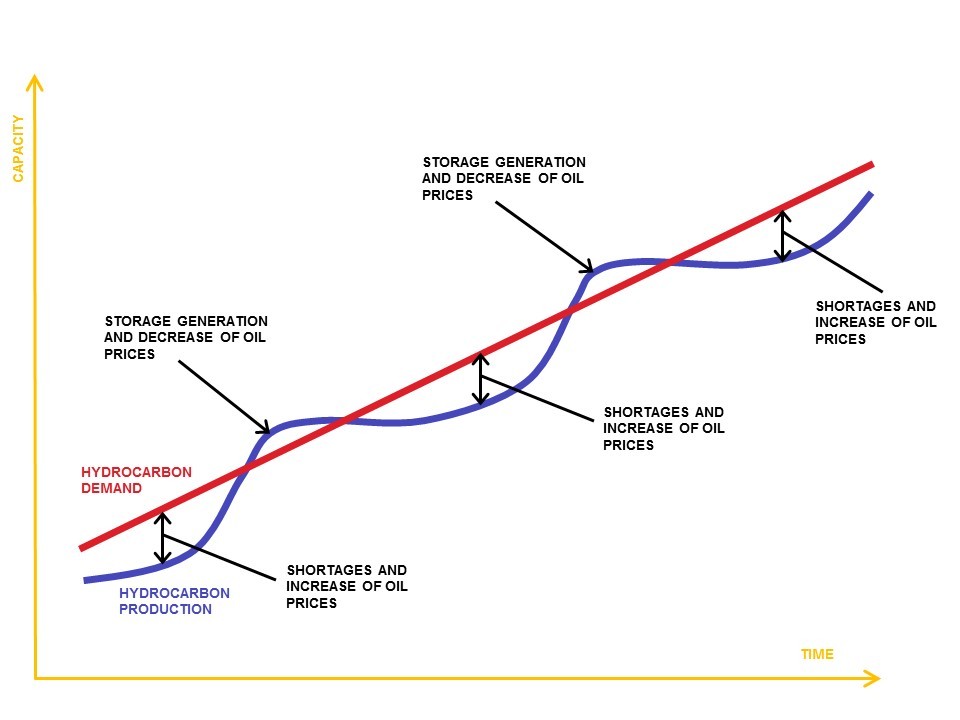
It is important to recall some fundamentals communicated in the previous article, especially regarding the large engineering efforts and time required to develop new oil and gas fields. Therefore, there is an inertia to achieve an overall production increase, justifying the cycles presented in Figure 1, which is a matter of market attractiveness for new developments and the seasonal relationship between supply and demand.
Figure 2 presents three global scenarios proposed for discussion, considering the combination of strategies for regulating oil production and managing the portfolio of new projects.
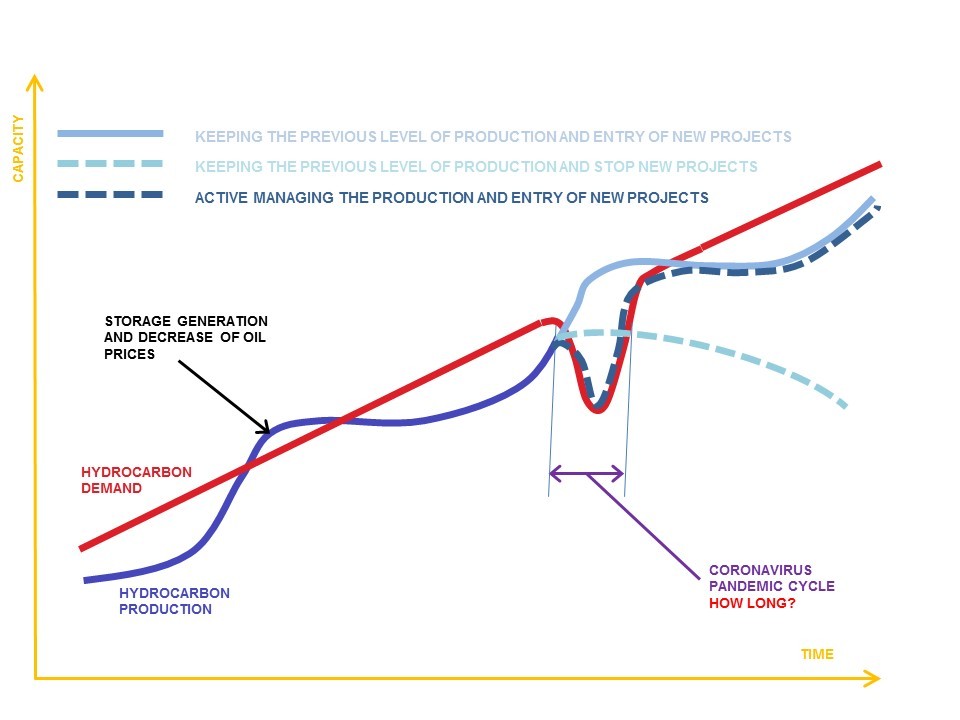
Here are some brief discussion about each one of the three possible scenarios.
SCENARIO 1 – The global industry will keep the previous level of production and entry of new projects
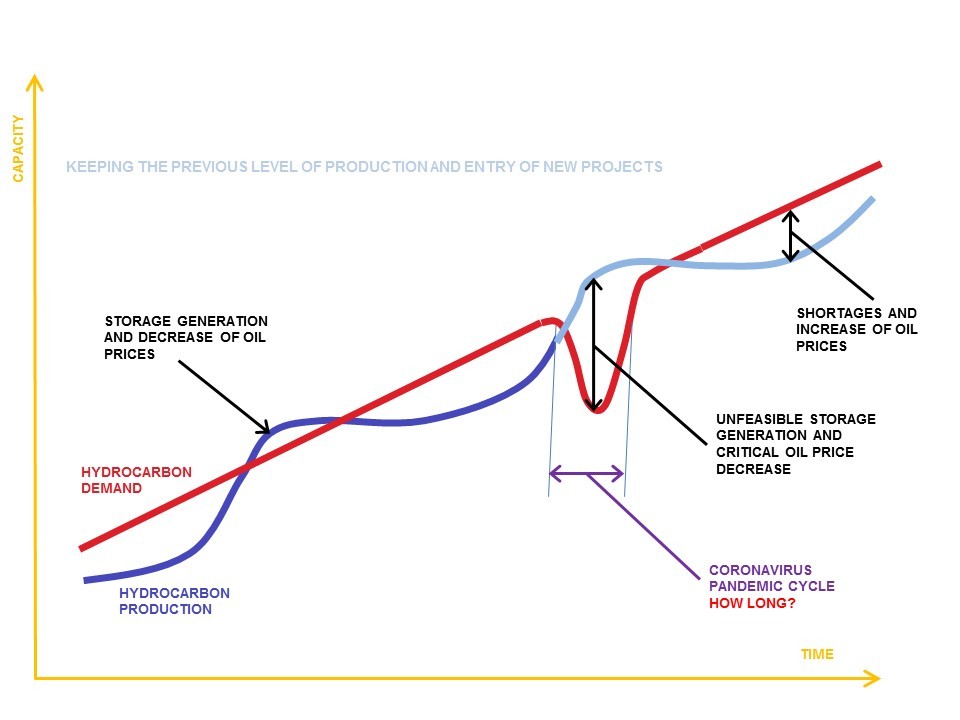
This scenario is unlikely to occur, because it seems to be not technically feasible in mid-term, due to limitation in oil storage capacity worldwide. In addition, the results of this scenario will inevitably lead to a profound drop in oil prices, what will make new projects not economically viable. This is the type of scenario whose impacts are well known for all global players and no one really wins in the medium to long term. However, political aspects that may influence this type of scenario can not be disregarded.
SCENARIO 2 – The global industry will keep the previous level of production and will stop new projects
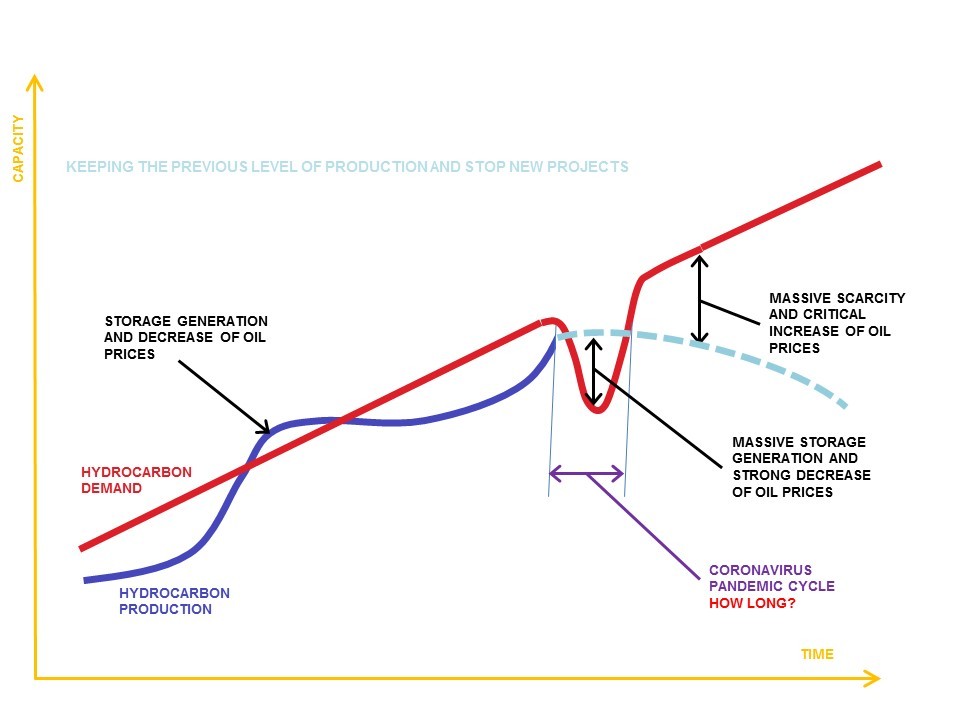
This scenario represents the continuity of the immediate reaction adopted by most of oil companies, which is to suspend or drastically reduce the development of new projects and try to maintain similar levels of production or with small reductions in less efficient platforms and fields. The understanding that the most consistent reduction in production will affect the short-term cash flow supports this immediate reaction from oil companies. While this immediate reaction is considerable by the risk containment aspect, the maintenance of this strategy for longer periods will lead to a massive generation of storage for this period of coronavirus pandemic. In addition, this scenario may cause insufficient demand for the sale of the commodity, leading to an even more severe decrease of oil prices and impact on cash flow.
SCENARIO 3 – The global industry will actively manage the production and entry of new projects
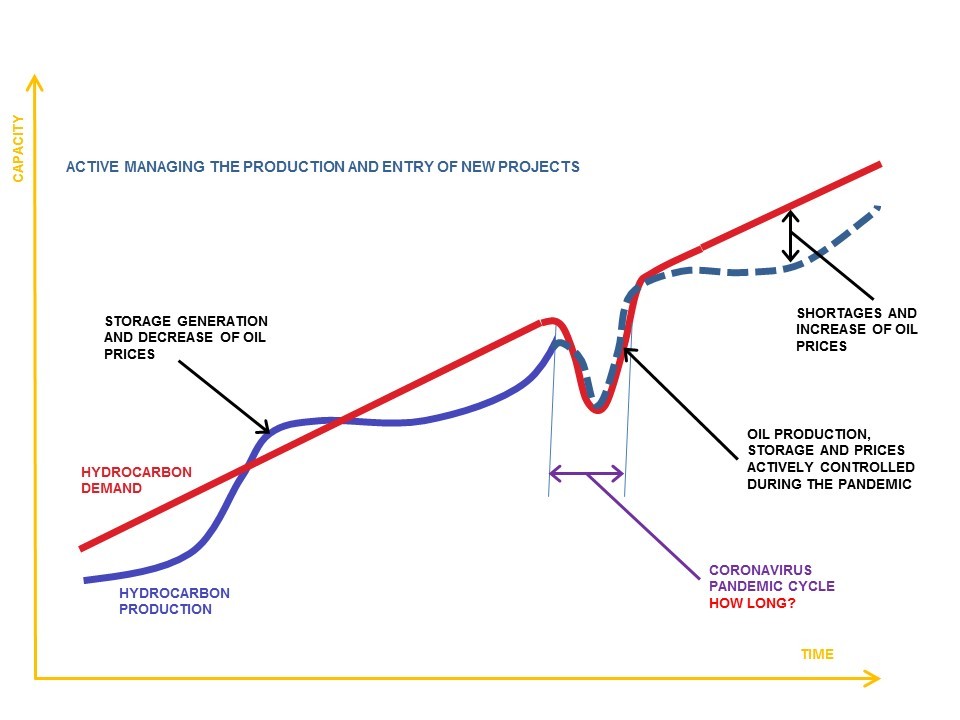
This is the most challenging scenario, as it means global coordination of all players, but should be possibly the strategy that may generate better results in the medium to long term. The reduction in production levels more drastically must be globally coordinated, so that everyone shares the risks and benefits of this strategy. However, if a single player does not fully join, this single company will only experience the benefits, which will lead other players to leave the coordination in cascade; inevitably leading to an intermediate scenario between the two previous scenarios presented.
For Discussion
Although the scenarios discussed are qualitatively defensible, the key question right now is still unanswered: how long will the coronavirus pandemic cycle last and what will be its effects? The lack of predictability about the duration and outcomes of the coronavirus pandemic is causing enormous anxiety across the industry, which leads to immediate projects freeze and cost reduction measures. However, the presented scenarios suggest that the strategy with potentially better results in mitigating the effects of the pandemic requires a high level of reaction, cooperation and coordination among global players. Cooperation should be the key!
Considering the three possible scenarios presented, the oil price is very likely to rise again to attractive levels. It is not possible to make any prediction in terms of time, but as soon as the coronavirus pandemic is under control, the demand should gradually return to similar levels before the pandemic, and the market cycle should take place again as the main factor of price regulation.
Regardless of the global strategy on regulation of production – which is beyond the control of companies alone – the scenarios discussed pointed to the importance of oil companies not stopping their production development projects. Considering in a medium-term perspective the demand should return to a regular level, the companies that optimizing their projects during the crisis should be in a better position to return and increase production faster, with higher returns on investments, than other companies that stopped or suspended their projects.
On a project optimization perspective, it is suggested that oil companies invest aggressively in a wider search of design options and accurate definition of technical specifications, focusing on integrated multidisciplinary development and adopting agile methodologies in the phases of feasibility assessment and screening of alternatives, aiming at finding the most optimized project envelope, with greater return on investments.
Coronavirus pandemic will inevitably reshape how industry manages its production decision and the assessment of projects` economics. The time for reacting to the new market conditions should be faster than ever. The production decisions and project economic assessment must be taken based on reliable and agile methods, allowing the decision makers to plan and execute the right movement to mitigate the impacts or even to keep a good level of profitability.
To support the reshape of oil companies’ culture, innovation and technology have never been so crucial like today. The digital transformation endeavors undertaken in recent years in the oil and gas industry and the respective technologies developed have now a challenge of unprecedented proportions to show their real transformative capacity. However, it is crucial to have a strategic alignment to incorporate such technologies immediately in order to allow the positive impacts in the necessary time.
And you – how do you believe the oil and gas industry will react to the coronavirus pandemic? Leave your comment and collaborate for the collective strategic thinking!
About the author:
Founder and COO at Deep Seed Solutions, is Master of Science from Catholic University of Rio de Janeiro with emphasis in Oil and Energy, Mechanical Engineer from CEFET of Rio de Janeiro, Post Graduated by the Executive MBA Program from Fundação Dom Cabral (FDC) and Certified as PMP-PMI. With over 25 years of experience in the mechanical industry, has advanced knowledge in design and manufacturing of equipment for the Automotive and Oil and Gas industries, accumulating solid experience in companies like Petrobras, Wood, Caram, Surco and Michelin. Over the past 14 years, developed his career leading projects in the oil and gas industry, with special emphasis in the development of offshore production systems at Petrobras, and developing conceptual, basic and executive projects of subsea production systems at Wood Group. As executive director at Deep Seed Solutions, has been the main architect of the expert system FLOCO and is currently supporting the digital transformation in the Oil & Gas Industry.